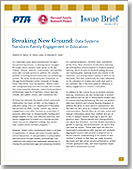The Harvard Family Research Project separated from the Harvard Graduate School of Education to become the Global Family Research Project as of January 1, 2017. It is no longer affiliated with Harvard University.

|
January 2011 Breaking New Ground: Data Systems Transform Family Engagement in EducationHeather B. Weiss, M. Elena Lopez, & Deborah R. Stark Download a PDF of this publication (485 kb) | View all publications in this series |
Article Information
- Full Text (HTML)
- Full Text (PDF: 485 kb)
PTA President Chuck Saylors discusses Breaking New Ground with co-author Elena Lopez from Harvard Family Research Project.
RELATED RESOURCES
For more information about using student data to engage families, please see the following resources from HFRP:
- FINE Newsletter: Using Student Data to Engage Families (October 2010)
- Data Driven: Making Student and School Data Accessible and Meaningful To Families (August 2010)
- Parent–Teacher Conference Tip Sheets (October 2010)
Harvard Family Research Project and the National PTA® have teamed up to bring you the second issue in our series of ground-breaking policy briefs. While the first brief, Seeing is Believing, looked at a variety of innovative practices to promote family engagement, Breaking New Ground: Data Systems Transform Family Engagement in Education narrows its focus to highlight sharing student data as a way to engage families and improve parent–teacher communication.
This brief describes how investments in student data systems are taking family engagement and student achievement to a whole new level. In addition to addressing areas where a student most needs improvement, the data can serve as a catalyst for home–school communication. Parents benefit from having information about key indicators on which they can have an impact, like student attendance, growth in learning, and achievement. The information opens the door for meaningful conversations with teachers and students so that parents can make informed decisions and take action to improve performance, school climate, graduation rates, and other important issues that affect their child’s success.
Breaking New Ground cites six case studies from across the country that reveal innovative efforts by early childhood programs and school districts to use student data systems to improve family engagement. Each profile illustrates a segment of a data pathway beginning in early childhood and continuing through students' academic careers.
The brief also includes a set of policy recommendations to help support the current trends in education that focus on twenty-first century learning and the vital role of technology.
TOOLS AND RESOURCES
Below are examples of some of the data tools and other resources used by the school districts and programs discussed in this brief.
ARIS PARENT LINK
- ARIS Parent Link Information for Parents (PDF, 3.2 MB)
This PowerPoint presentation is an example of a tool used for parent training workshops about ARIS Parent Link. Slides 29 and 30 are of particular interest, as they demonstrate how student assessment scores are explained to parents, making these scores more meaningful and actionable.
CREIGHTON SCHOOL DISTRICT
- Parent Learning Calendars
These academic pacing guides for parents provide greater awareness of curriculum, teaching, and assessment. By following the calendars, parents can help their children practice the skills that are being taught in class, they can do the sample activities to get additional practice, and they can review important skills to ensure success in upcoming assessment.
NEW VISIONS FOR PUBLIC SCHOOLS
- New Visions for Public Schools: Using Data to Engage Families (PDF, 522 KB)
This case study of the New Visions program in New York City includes examples of the college readiness tracking tool (page 7) that is distributed to parents. The case study also includes the School Data Snapshot (page 6) tools which give an overall picture of student performance at each school, broken down by class. - New Visions 9th Grade Tracker (PDF, 397 KB)
This one-page tool is distributed to parents of freshman to help them assess whether their child is on track to graduation and college readiness. The color coding helps to highlight both successes and problem areas, with green representing "on-track," yellow representing "almost on-track," and red representing "off-track."
POWAY UNIFIED SCHOOL DISTRICT
- MAP Resources for Parents
Based on the MAP assessment program, this page provides tools for parents to help with student goal setting and score tracking.
TOOLS OF THE MIND
- Parent Information
Tools of the Mind's website provides parents with tools such as tips to promote mature play at home based on children’s age groups, as well as a guide to selecting an early childhood program that promotes the development of self regulation.
WASHOE COUNTY SCHOOL DISTRICT AND NEVADA STATE PIRC
- Parent School Partnership (PSP) Program Curriculum
PSP is a series of classes for elementary, middle-, and high-school parents. It is a bilingual, research-based parent involvement curriculum that helps parents understand the school system, know their educational rights and responsibilities, navigate the road to careers and college, communicate with school staff more effectively, and become advocates for their children.


